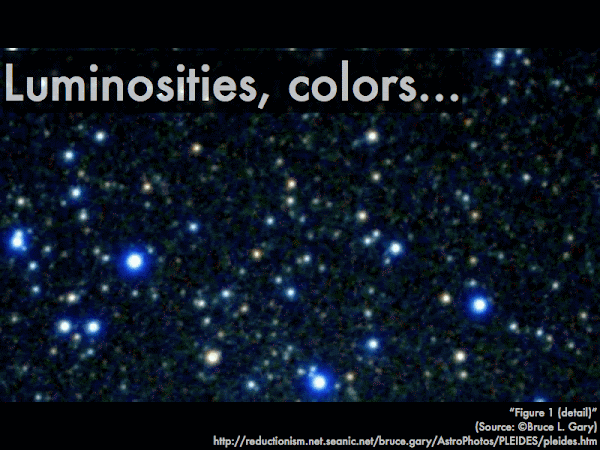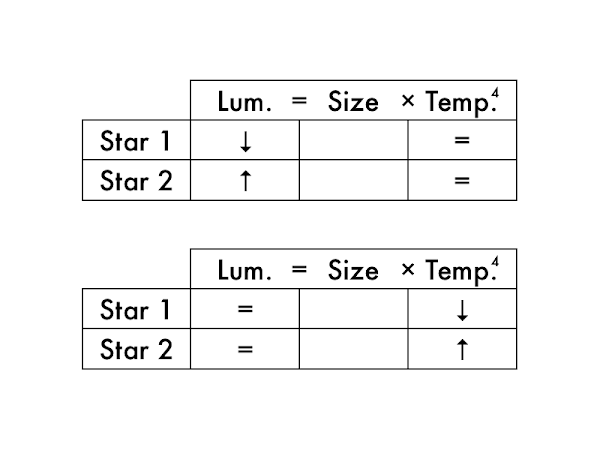Cuesta College, San Luis Obispo, CA
Students have a weekly online reading assignment (hosted by SurveyMonkey.com), where they answer questions based on reading their textbook, material covered in previous lectures, opinion questions, and/or asking (anonymous) questions or making (anonymous) comments. Full credit is given for completing the online reading assignment before next week's lecture, regardless if whether their answers are correct/incorrect. Selected results/questions/comments are addressed by the instructor at the start of the following lecture.
The following questions were asked on reading textbook chapters and previewing presentations on parallax, distance, apparent magnitude, absolute magnitude, Wien's law and the Stefan-Boltzmann law.

Selected/edited responses are given below.
Describe something you found interesting from the assigned textbook reading or presentation preview, and explain why this was personally interesting for you.
"I didn't find anything specific extremely interesting about this chapter. In general stars are a pretty amazing topic and it was interesting to know how exactly they measure the size, distance, and brightness. I really appreciated the slide on the presentation that demonstrated parallax. It definitely helped me understand the term, and I'm pretty sure I won't forget it."
"That astronomers can tell the tempertures of stars just by looking at their colors."
"Blue is generally a cool color and red usually represents hot so it's interesting that in the case of star temps, it's opposite."
"That the sun is not the brightest star. It just seems brightest because it is the closest. I found this interesting because I always thought the sun was one of the brightest stars."
"That we can measure the distance a star is from us using parallax."
"I found it all very interesting."
"At least I get the magnitude scale..."
Describe something you found confusing from the assigned textbook reading or presentation preview, and explain why this was personally confusing for you.
"Everything! Not following at all."
"Having trouble with was remembering which colors are the hotter and which the colder because it seemed to be backwards."
"I have no idea how the Stefan-Boltzmann law works."
"Apparent magnitude and absolute magnitude. Still not to sure what it does."
"Something that really confused me was the brightness scale. I know I am going to mix it up with -1 being brighter than +6! This is confusing because I just think positive would mean brighter"
"Parsecs and arc seconds, closer/farther brighter/dimmer stars...? Maybe it doesn't matter how they all relate, just go with it. It's confusing when I have to answer and figure out the H-R diagrams, attempting to put all this info makes my brain feels like a dense mud pie"
Explain how apparent magnitude and the absolute magnitude are defined differently.
"Apparent magnitude is a measure of brightness of a star as seen by human eyes on Earth. Absolute magnitude is the apparent visual magnitude the star would have if it were 10 pcs away."
"Apparent magnitude is the observer's perspective of an objects brightness whereas, absolute magnitude compensates for the distance of an object, by using 'fair comparison distance' which is 10 parsecs."
"m: brightness of a star as seen from an observer. M: brightness of a star when at 10 parsecs away, more mathematical than actual observing."
Suppose the sun was moved to a distance of 10 parsecs away. As a result, its __________ magnitude would become dimmer.
absolute. *********** [11] apparent. ********* [9] (Both of the above choices.) * [1] (Neither of the above choices.) [0] (Unsure/guessing/lost/help!) * [1]

(Only correct responses shown.)
1 (brightest): the sun, m = –27 [64%]
2: Canopus, m = –1 [55%]
3: Vega, m = 0 [64%]
4 (dimmest): Kapteyn's star, m = +9 [81%]
Rank the brightnesses of these stars (1 = brightest, 4 = dimmest; there are no ties), if relocated to 10 parsecs from Earth.
(Only correct responses shown.)
1 (brightest): Canopus, M = –3 [50%]
2: Vega, M = +0.5 [59%]
3: the sun, M = +5 [41%]
4 (dimmest): Kapteyn's star, M = +11 [64%]
Determine the stars that get dimmer or brighter when relocated from their original positions to 10 parsecs from Earth.
(Only correct responses shown.)
The sun: gets dimmer [73%]
Canopus: gets brighter [64%]
Vega: gets dimmer [41%]
Kapteyn's star: gets dimmer [45%]
Rank the temperatures of these main sequence stars (1 = hottest, 4 = coolest; there are no ties).
(Only correct responses shown.)
Hottest: blue main sequence star [68%]
Second hottest: white main sequence star [74%]
Third hottest: yellow main sequence star [73%]
Coolest: red main sequence star [73%]
Rank the temperatures of these supergiant and dwarf stars (1 = hottest, 4 = coolest; there are no ties).
(Only correct responses shown.)
Hottest: blue supergiant [68%]
Second hottest: white dwarf [41%]
Third hottest: yellow supergiant [50%]
Coolest: red dwarf [68%]

dimmer. **** [4] brighter. ************** [14] (These stars would be the same size.) * [1] (Unsure/guessing/lost/help!) *** [3]
Two stars (equally far away) have the same brightness, but one star is cooler, and the other star is hotter. The __________ star will be larger in size.
cooler. ********* [9] hotter. ******** [8] (These stars would be the same size.) ** [2] (Unsure/guessing/lost/help!) *** [3]
Ask the instructor an anonymous question, or make a comment. Selected questions/comments may be discussed in class.
"Why are dwarfs the coolest stars?" (Well, red dwarfs are cool, but white dwarfs are hot. And red giants are cool, but white giants are hot. #sizemattersnot)
"What's your favorite part of astronomy?" (This stuff--star parameters, and how they live and die.)
"I feel like I'm understanding these chapters more then the previous chapters."
"HELP ME WITH THE MATH WITHOUT MATH STUFF AHHHHHHHH"
No comments:
Post a Comment